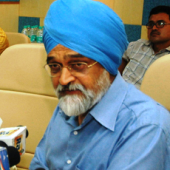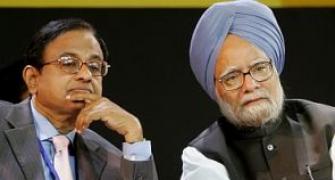 Planning Commission Deputy Chairman Montek Singh Ahluwalia said on Monday a target of eight per cent average annual growth rate for the 12th Plan (2012-13 to 2016-17) was not possible if the private sector did not contribute half of a trillion dollars required for infrastructure funding during the period.
Planning Commission Deputy Chairman Montek Singh Ahluwalia said on Monday a target of eight per cent average annual growth rate for the 12th Plan (2012-13 to 2016-17) was not possible if the private sector did not contribute half of a trillion dollars required for infrastructure funding during the period.
“In the 12th Plan period, no less than 50 per cent of the estimated investment would have to necessarily come from the private sector, as there are zero prospects of the government being able to finance such projects.
"If it can’t be done, we better lower the growth projection,” Ahluwalia said at a summit organised by the Federation of Indian Chambers of Commerce and Industry in New Delhi.
He said private-sector participation in infrastructure public-private partnership projects had grown substantially, from 10 per cent of the required investment in the 10th Plan period to 37 per cent during the 11th.
In the first two years of the 12th Plan -- 2012-13 and 2013-14 -- India would grow by an average 5.8 per cent annually, even if the upper band of growth projections for the current financial year -- 6.1-6.7 per cent -- pegged by the Economic Survey is assumed to be true.
Even then, it would require the economy to grow over nine per cent in the last three years of the Plan.
Ahluwalia urged the private sector to share and absorb the risks that are normally associated with model concession agreements under the PPP model and expressed regret that very little thinking had been done by the private sector on such agreements.
“On the issue of non-delivery of statutory clearances on time for PPP projects, a clear thinking has to emerge on what a concession agreement should entail,” he said.
Any penalty to be imposed on the government, would be resisted within the government, he said and added due diligence on the matter was required in the next two years.
He urged private players to figure out how ‘force majeure’ provisions in concession agreements were to be handled.
It is important to clearly spell out what exactly is needed to be built in by way of force majeure in contracts.
Force majeure is a clause in an agreement that frees both the parties of obligation when an event beyond the control of parties delays projects.
Most contracts contain force majeure provisions although they are not generally considered in detail by companies when they are negotiating a contract.
As they are drafted to cover unusual or unexpected events they are not frequently relied upon.
Economic Affairs Secretary Arvind Mayaram emphasised the need for more regulators for different infrastructure sectors with clearly defined Terms of Reference.
“Regulators have to be empowered and be independent of both the parties to a contract,” he said.
He underlined the need for adequate resources to maintain existing infrastructure, while scouting for funds for creating new assets.
Mayaram said both, the government and the private sector, were beset with the problem of lack of institutional capacities to manage concession agreements over a 20-year period.
It was high time to have a re-look at such capacities for managing and maintaining PPP projects, he said.
He said once the construction of a project is over and it gets stabilised, there should be easy exit for a developer and the ease for a competent facility manager to come in.
Image: Montek Singh Ahluwalia










